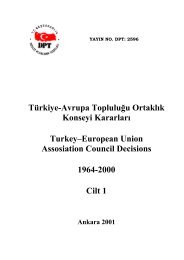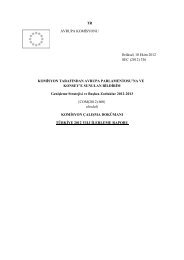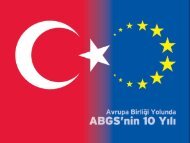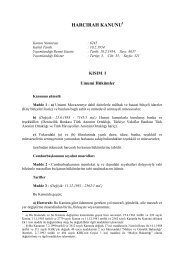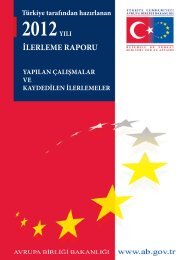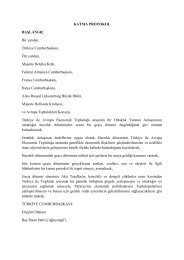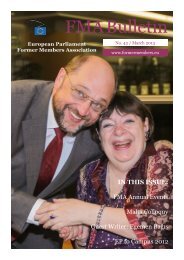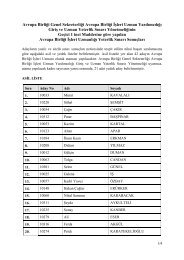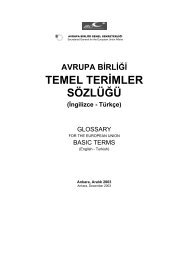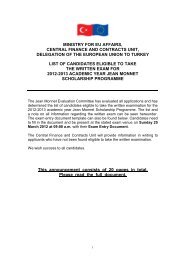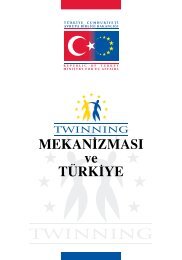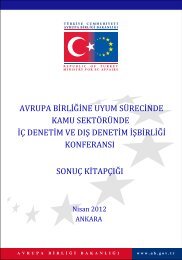2010 ilerleme raporu - Avrupa BirliÄi BakanlıÄı
2010 ilerleme raporu - Avrupa BirliÄi BakanlıÄı
2010 ilerleme raporu - Avrupa BirliÄi BakanlıÄı
You also want an ePaper? Increase the reach of your titles
YUMPU automatically turns print PDFs into web optimized ePapers that Google loves.
However, Turkey’s approach to minority rights remains restrictive. Turkey is a party to the<br />
UN International Covenant on civil and political rights, but its reservations regarding the<br />
rights of minorities and the UN Covenant on economic, social and cultural rights regarding<br />
the right to education are causes for concern. Turkey has not signed the Council of Europe<br />
Framework Convention for the protection of national minorities.<br />
A constructive dialogue between Turkey and the OSCE High Commissioner on National<br />
Minorities, including on participation by minorities in public life and broadcasting in minority<br />
languages, would facilitate further alignment with international standards and best practice in<br />
EU Member States.<br />
The situation of the Greek minority has not changed. It continues to encounter problems with<br />
education and property rights, including on the islands of Gökçeada (Imvros) and Bozcaada<br />
(Tenedos). Management of minority schools, including dual headship 29 , remains an issue,<br />
pending an implementing regulation. The schools face procedural and bureaucratic difficulties<br />
with registration, budget problems and sustainability problems due to the number of students<br />
(restricted by law on condition that they must be from the same minority) plus administrative<br />
issues and educational problems.<br />
Anti-Semitism remains an issue, especially in connection with hate speech in the pro-Islamist<br />
and ultranationalist media.<br />
The court case on the murder of Armenian journalist Hrant Dink is continuing without<br />
significant progress. The court case against two protestants in Silivri is continuing under<br />
Article 301 of the Turkish Criminal Code, as allowed by the Ministry of Justice. The Malatya<br />
murder case continued. The court case against the coup plan, referred to as ‘cage plan’<br />
targeting non-Muslim minorities started in June. (See Civilian oversight of security forces)<br />
Overall, Turkey's approach on minorities remains restrictive. Full respect for and protection of<br />
language, culture and fundamental rights, in accordance with European standards, have yet to<br />
be fully achieved. Turkey needs to make further efforts to enhance tolerance or promote<br />
inclusiveness vis-à-vis minorities.<br />
As regards cultural rights, the Regulation on the Radio and Television Supreme Council<br />
(RTUK) was amended in November, removing all restrictions on broadcasting in Kurdish and<br />
other languages by private and public channels at local level. Fourteen radio stations and TV<br />
channels have been given permission to broadcast in Kurdish and Arabic. Restrictions have<br />
been lifted. (See Chapter 10)<br />
For the first time, the Diyarbakır Municipal Theatre staged a play in Kurdish. In June, the<br />
State Minister for EU Affairs invited all EU embassies to a Kurdish literature event in the<br />
village of Bahcesehir (Van).<br />
Mardin Artuklu University established the first Kurdish and Assyrian language departments,<br />
and started to accept students to post-graduate programmes organised by these departments.<br />
TRT started broadcasting 24 hours a day in Arabic on the TRT El Turkiye television channel,<br />
which can be watched via satellite by more than three million viewers.<br />
29<br />
The deputy head of these schools is a Muslim representing the Ministry of Education and has more<br />
powers than the head.<br />
EN 32 EN




